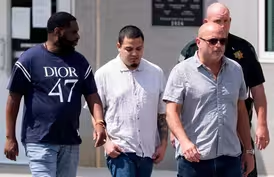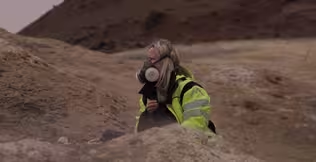
Does Trump have the power to end mail-in voting?
Clip: 8/23/2025 | 6m 18sVideo has Closed Captions
Does Trump have the power to end mail-in voting? Legal scholar weighs in
With control of Congress at stake in the 2026 midterm elections, Trump is doubling down on efforts to end mail-in voting. In the 2024 election, nearly 30% of Americans who voted cast their ballots by mail. Despite a multimillion-dollar Republican push to encourage supporters to vote by mail, Trump says it’s a fraud. John Yang speaks with legal scholar Rick Hasen for more.
Problems playing video? | Closed Captioning Feedback
Problems playing video? | Closed Captioning Feedback
Major corporate funding for the PBS News Hour is provided by BDO, BNSF, Consumer Cellular, American Cruise Lines, and Raymond James. Funding for the PBS NewsHour Weekend is provided by...

Does Trump have the power to end mail-in voting?
Clip: 8/23/2025 | 6m 18sVideo has Closed Captions
With control of Congress at stake in the 2026 midterm elections, Trump is doubling down on efforts to end mail-in voting. In the 2024 election, nearly 30% of Americans who voted cast their ballots by mail. Despite a multimillion-dollar Republican push to encourage supporters to vote by mail, Trump says it’s a fraud. John Yang speaks with legal scholar Rick Hasen for more.
Problems playing video? | Closed Captioning Feedback
How to Watch PBS News Hour
PBS News Hour is available to stream on pbs.org and the free PBS App, available on iPhone, Apple TV, Android TV, Android smartphones, Amazon Fire TV, Amazon Fire Tablet, Roku, Samsung Smart TV, and Vizio.
Providing Support for PBS.org
Learn Moreabout PBS online sponsorshipJOHN YANG: With control of Congress at stake in next year's midterm elections, President Trump is doubling down on efforts to end mail-in voting.
In the 2024 election, nearly 30 percent of Americans who cast their ballots did it by mail.
Despite a multimillion dollar Republican drive to encourage supporters to vote by mail last year, the president says it's a fraud.
DONALD TRUMP, U.S. President: We as a Republican Party are going to do everything possible that we get rid of mail-in ballots.
We're going to start with an executive order that's being written right now by the best lawyers in the country to end mail-in ballots because they're corrupt.
JOHN YANG: He also said that the United States is just about the only country in the world that uses them.
Rick Hasen is a professor of law and political science at UCLA.
He's also the author of "A Real Right to Vote: How A Constitutional Amendment Is Can Safeguard American Democracy."
Rick, I want to begin by parsing some of what we just heard from the President.
He says that just about the only country in the world that uses them is the United States.
Is that true?
RICK HASEN, UCLA School of Law: No, it's not true.
It's used around the world and lots of other democracies, including in Canada and the United Kingdom and Germany.
JOHN YANG: Says he's going to issue an executive order to end mail in ballots.
Is that within his powers?
RICK HASEN: So, no.
First of all, an executive order is an order to the executive branch as to how to carry out the laws.
It's not a royal edict.
He can't just decree that we don't have mail-in balloting anymore.
The Constitution says that each state gets to set its own rules for running elections.
And in Article 1, Section 4, it lets Congress override those rules as to congressional elections.
Congress also sometimes acts under its powers, for example, to enforce the 15th Amendment to bar race discrimination in voting.
The President's job is to take care that the laws passed by Congress are faithfully executed.
So, he's got a lot of powers in terms of how the federal government might interact with states, but it's primarily states that are running elections.
And he has no direct authority over how elections are going to be conducted, whether it's for federal elections or for state and local elections.
JOHN YANG: Well, that counters what he said on Truth Social.
He said the states are merely an agent for the federal government in counting and tabulating the votes they must do with the federal government as represented by the President of the United States tells them.
RICK HASEN: That's just a fiction.
That's not how things work.
The Constitution does say that Congress can override.
So if Congress passed a law tomorrow that either outlawed or mandated mail-in balloting, that law would probably be upheld as applied to congressional elections.
Couldn't be applied to state or local elections, because the power only extends to congressional elections.
But the President doesn't have the power.
States are more than agents.
States and this goes back to the founding.
States were the primary actors that administered elections.
There wasn't agreement to have National Election Administration the way it is in most other countries today.
And that diversity of how elections are run, it makes for some confusion sometimes, but it can be a strength against an executive that's trying to impose its will, as we see the president trying to do here.
JOHN YANG: He says he's doing this because he wants to make sure there's no fraud.
We've had a long experience with mail-in ballots in Oregon for about 25 years.
It's the only way you can vote.
What's the record is there of fraud and corruption in these things?
RICK HASEN: Well, you're right that there are some states, including Oregon, Washington, Utah and lots of other where mail-in balloting is the primary way that voting is conducted.
There are lots of states like California where I am, where many people vote by mail.
And there are some states where mail in balloting is not all that common.
It did increase during COVID because people didn't want to go to polling places.
What we do know is that the president in 2020, in the midst of the COVID pandemic, when he was running against Joe Biden, railed against mail-in balloting, said that it was fraudulent.
There were tons of investigations.
There were 60 plus lawsuits challenging the election on fraud grounds.
And there was no evidence of any fraud related to mail-in ballots that could have affected the election anywhere in the United States.
There are sometimes small locales where there is election fraud and it sometimes does occur with mail-in ballots, but not on the kind of scale that the president's talk about.
And in his social media post he talked about getting rid of voting machines as well.
And it's not clear what machines he's talking about.
I don't know what he has in mind, not only about what powers he thinks he has, but what exactly he thinks he wants to do since Republicans in states like Arizona and Florida rely very heavily on mail-in balloting to get out the votes of their own supporters.
JOHN YANG: This morning the Texas legislature sent Governor Abbott there that they're the newly drawn maps they're trying to pick up the Republican seats in the House.
Do mail-in ballots favor one party over another?
RICK HASEN: Well, historically, Republicans were much more likely than Democrats to use mail-in ballots, in part because people who are older, richer, whiter tend to move less.
And those are people who tend to use mail-in balloting more.
In more recent years, Democrats have achieved parity and in some places exceeded Republican use of vote by mail, in part because Democrats realized that if they pushed early voting, they could kind of bank their votes and then they don't have to worry about as many people on Election Day.
I would say that if the president had not been putting out all of these negative tweets and other statements about mail-in balloting, deriding it, you'd see both Democrats and Republicans using it more and more.
We do know that in 2024, an election that Donald Trump won, Republican voters expressed much more confidence in the election process and much more support for vote by mail.
In 2024, the President was not really so against smoke by mail, but now he's back on this, and so we'll see where it goes.
JOHN YANG: Election law expert Rick Hasen of UCLA, thank you very much.
RICK HASEN: It's been a pleasure speaking to you.
Aid worker on conditions in Gaza City after famine declared
Video has Closed Captions
Clip: 8/23/2025 | 5m 50s | ‘Purely in survival mode’: Aid worker shares conditions in Gaza City after famine declared (5m 50s)
News Wrap: ICE seeks to deport Abrego Garcia to Uganda
Video has Closed Captions
Clip: 8/23/2025 | 4m 15s | News Wrap: ICE seeks to deport Kilmar Abrego Garcia to Uganda (4m 15s)
Scientists study effect of melting glaciers on volcanoes
Video has Closed Captions
Clip: 8/23/2025 | 6m 43s | As glaciers melt, scientists study potential for more violent volcanic eruptions (6m 43s)
Providing Support for PBS.org
Learn Moreabout PBS online sponsorshipSupport for PBS provided by:
Major corporate funding for the PBS News Hour is provided by BDO, BNSF, Consumer Cellular, American Cruise Lines, and Raymond James. Funding for the PBS NewsHour Weekend is provided by...












